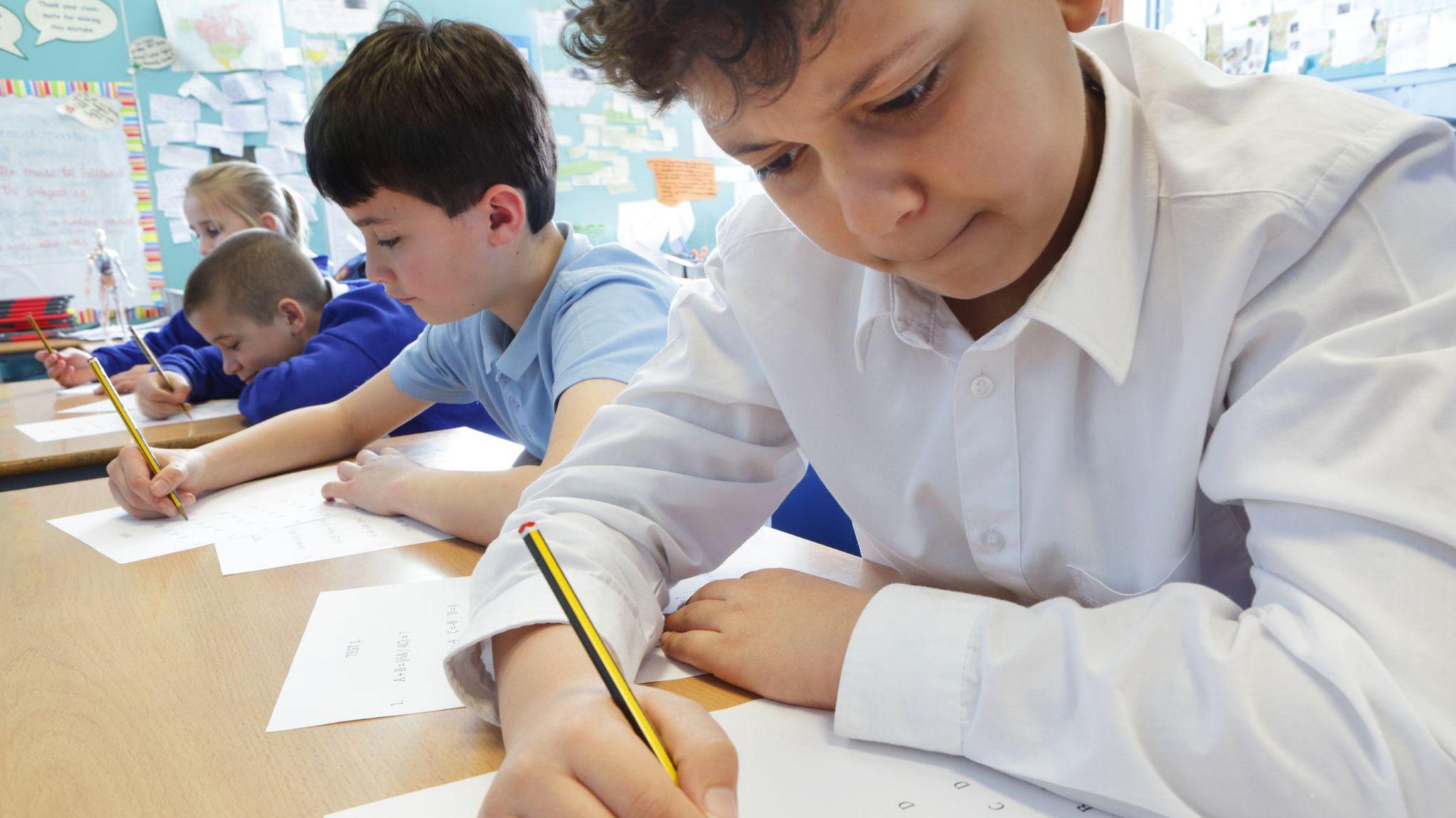Sats results rise but stay below pre-Covid levels

- Published
Overall standards in reading, writing and maths have risen among Year 6 pupils in England but are still lower than before the pandemic.
Sats results show 61% of pupils reached the expected level in these three subjects combined, up from 60% last year.
In 2019, the last year Sats were taken before Covid-19 lockdowns, that percentage was 65%.
The government said there were "far too many pupils" not meeting expected levels.
The last government said it wanted 90% of pupils to be reaching those standards by 2030. BBC News has asked the Department for Education whether that target will remain in place.
In individual subjects, the proportion of pupils reaching the expected level either increased from 2023 or stayed the same:
74% in reading, up from 73%
73% in maths, the same as 2023
72% in writing, up from 71%
72% in grammar, punctuation and spelling, the same as 2023
81% in science, up from 80%
Education secretary begins push to recruit 6,500 new teachers
- Published8 July 2024
Reading results fall in Year 6 Sats tests
- Published11 July 2023
Exam board faces £300k fine for 'major failings'
- Published9 July 2024
Initial results for 2023 suggested 59% of pupils reached the expected standard in reading, writing and maths, but this was later revised to 60%.
Education Secretary Bridget Phillipson congratulated pupils in a video posted on X and said: "This government will see you as more than just your test results."
Catherine McKinnell, a new education minister, said this year's figures showed there were “far too many pupils who are not meeting the expected standard” and that there had been “almost total stagnation in progress nationally over the past three years”.
“This government will give teachers and families the support their efforts deserve and make sure every child leaves primary school with strong foundations for future learning,” she said.
Pepe Di’Iasio, general secretary of the Association of School and College Leaders, said the results highlighted “the ongoing impact of the educational disruptions caused by Covid-19”.
“Despite the tremendous efforts by schools to provide catch-up support, the learning loss experienced by some students, particularly those from disadvantaged backgrounds, was considerable,” he said.
He urged the new government to restore funding for the National Tutoring Programme, which was set up to help children catch up after Covid lockdowns disrupted education and is set to finish at the end of this academic year.
Other teaching unions called for the tests to be scrapped.
Daniel Kebede, general secretary of the National Education Union, said Sats placed "intense pressure" on schools and resulted in "narrower curriculums".
"The new government must seize the opportunity to bring our assessment system into the 21st century," he said.
Paul Whiteman, general secretary of the National Association of Head Teachers said the tests were "given disproportionate significance and pile pressure onto pupils and staff".
He said the school leaders' union would work with the new government to "develop an alternative and more proportionate approach".
Former Labour leader Jeremy Corbyn pledged to scrap Sats in 2019. The new government has not gone that far but has pledged to launch "an expert-led review of curriculum and assessment".
"Our review will consider the right balance of assessment methods whilst protecting the important role of examinations," it said.
What are Sats?
Standard Assessment Tests, or Sats, are tests that children take in Year 6, at the end of Key Stage 2. They are national curriculum assessments in English grammar, punctuation and spelling, English reading and maths.
The government's Standards and Testing Agency says the purposes of Sats tests are to:
help measure pupils' progress
identify if they need any extra help in certain areas
assess schools' performances
produce national performance data.
Children also sit Sats in Year 2, at the end of Key Stage 1.